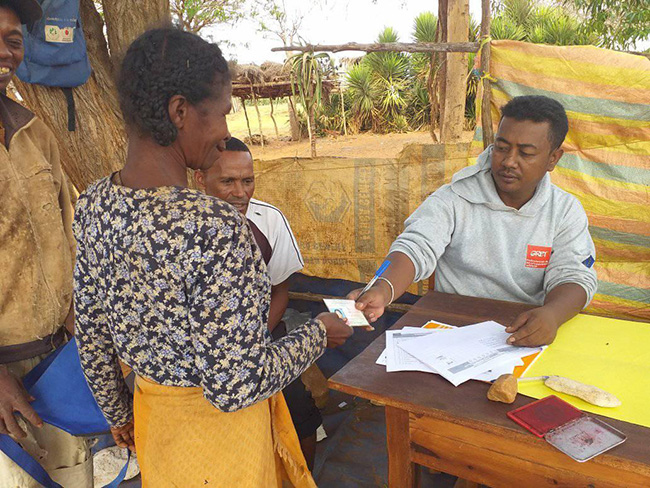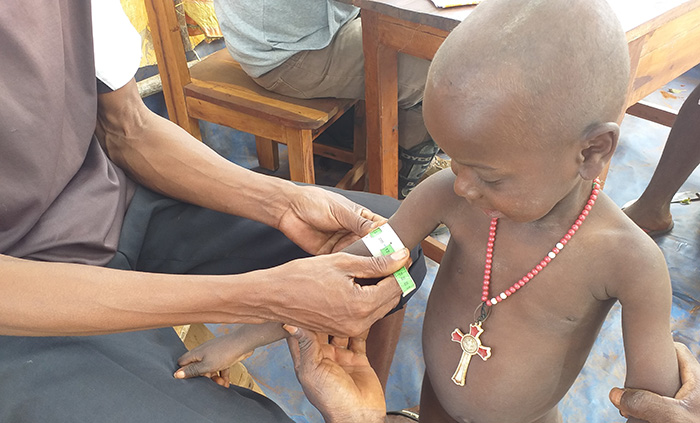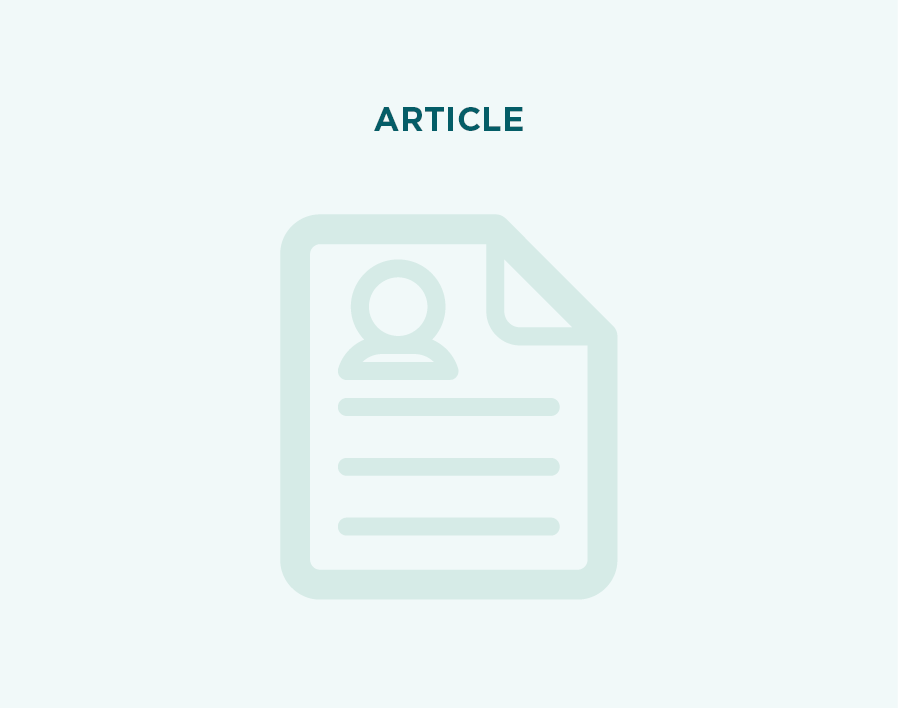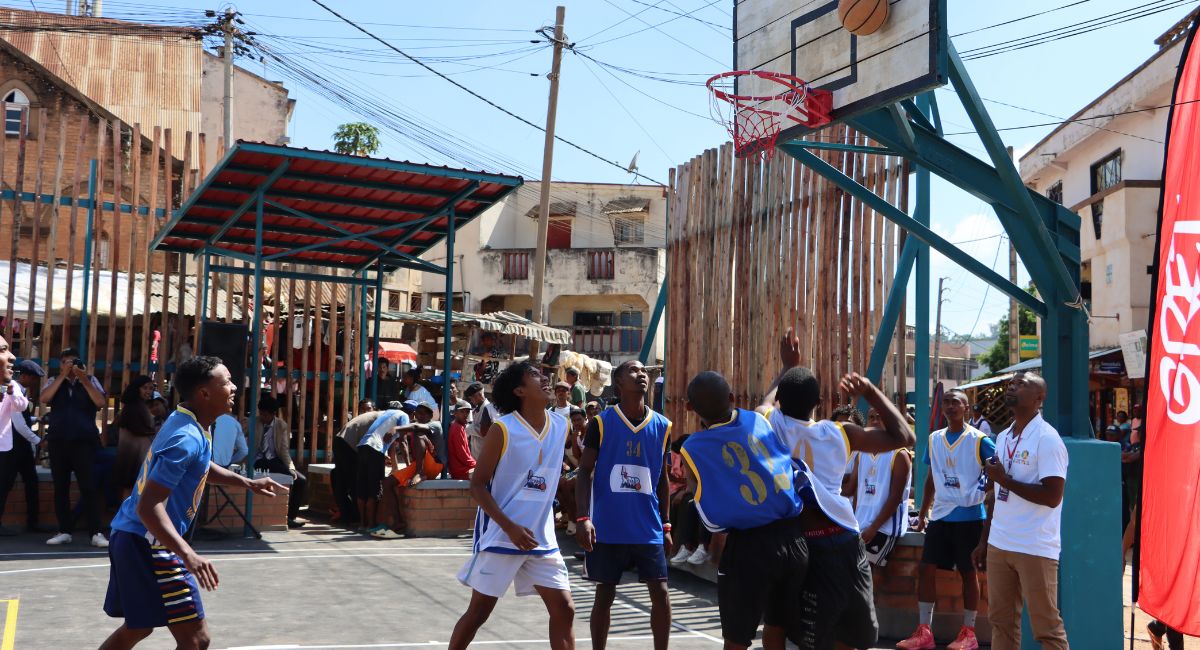In the Grand Sud region of Madagascar, particularly in the Androy region, chronic lack of rain and constant wind are creating recurrent drought, which is generating severe food crises called “Kéré”. Exacerbated by deforestation and climate change, this year the situation is extremely acute, endangering thousands of lives.
“The situation is critical: it hasn’t rained since March and water tanks are empty. Families have no more food, apart from cactus or wild fruit”, explains Hanitra Rafanomezantsoa, head of GRET’s Ambovombe office in Madagascar. Climate change, extreme poverty and lack of basic services are today accentuating shortage of food and water – a situation this region has been regularly experiencing for decades. Since the start of the crisis in September, the kéré has already caused the death of several children, and according to estimates almost 120,000 children could be suffering from acute malnutrition by the end of the year.

Recurrent water stress
Access to drinking water is a recurrent problem throughout the Grand Sud region. In 2007, faced with a similar episode of drought, a movement for solidarity was created in Reunion Island to help inhabitants in the Androy region. Launched by the Antenne Réunion TV channel and the Kéré Association, the first Operation Kéré led to a great wave of solidarity, enabling GRET to construct 64 water tanks and renovate 11 rainwater basins (impluvia). More than 50,000 people, including 24,000 children, benefitted from improved access to drinking water, thanks to these developments.
The majority of these infrastructures are still operational, but could not be filled in recent months due to lack of rain. But in the last 13 years, they have become damaged; some are cracked, and the roofing and gutters on school buildings that supply rainwater to the tanks – and taps – are partly defective. They need to be renovated to become fully functional again.
“In normal circumstances, pupils are enthusiastic about going to school. But because of the ongoing Kéré, numbers are down and the children are increasingly absent […] The majority of children are falling asleep in class, some are fainting during play time. Others can’t manage to stay in class and go outside to look for red cactus in the fields. Last week, only 4 pupils came to class, compared to 300 or 400 normally.”
Soavinaly, Primary school principal
In parallel, the large majority of households in the Androy region currently have no more food stocks. Families with cattle are selling their animals to buy food; others have sold everything they have and have no other choice but to eat fruit and red cactus plants.

A new emergency mobilisation
Given this extremely serious situation, endangering the lives and health of thousands of people, a new Operation Kéré was launched in October by the Kéré Association, with support from the Réunion la 1ère TV channel and the Journal de l’île de La Réunion newspaper. The operation generated very strong mobilisation among inhabitants, companies and artists in Reunion, as well as support from the island’s Regional Council and the city of Saint-Denis. This enabled GRET, which has been present in Madagascar for 20 years, to start organising distribution of food and water to inhabitants in the district of Tsihombe from 23 October. GRET’s intervention is focusing on 15 fokontany (villages) and is being rolled out among 1,200 households, i.e. approximately 7,200 people. Food aid being distributed is made up mainly of cereals and legumes, covering 50 % of families’ nutritional needs. Special attention is being given to children aged between 6 months and 5 years, who are particularly vulnerable to malnutrition. Koba Aina, a fortified infant flour with high nutritional quality and produced in Madagascar by the Nutri’zaza social business, is being distributed to 1,350 children in the zone of intervention. Lastly, water is transported each week by truck from zones that are less affected by drought, and distributed to inhabitants or stored in the tanks that were constructed in 2007.

“We are seeing high levels of vulnerability among children under the age of 5, who are significantly impacted by diarrhoeal illnesses, coughing and flu, especially due to the quality of the water they drink, which is not hygienic because we have a water supply problem. The majority of the population drinks water that is not potable, hence the increase in illnesses. Women and children are most affected and come to be seen at the Health Centre.”
Dieudonné Tsida Andriatsimihafara, Manager of the level II Basic Health Centre in the commune of Nikoly
Intervening today…
The mobilisation culminated with a special Kéré evening event, organised on 28 November by the Kéré Association and Réunion la 1ère. The event, which was broadcast live on TV in Reunion Island, brought together approximately twenty artists, key stakeholders, doctors and several of GRET’s experts. As at the date of writing, thanks to this event, and through several other initiatives in Reunion Island, 570,000 € have been raised for the moment. This fund will primarily be used to respond to the emergency, but will also be used to fund sustainable solutions in terms of drinking water, food and nutrition for populations in the south of Madagascar.

Despite an increase in emergency responses, the food and nutrition situation is still very tense in the Androy region. The water situation is still very worrying, and distribution will need to continue until the next rains, hopefully in early 2021. To avoid a recurrence of this situation, “pre- and post-crisis management is just as important as management of the crisis itself”, explains Claire Costis, nutrition projects manager with GRET. “Lessons drawn from GRET’s experience in the region have demonstrated the need to establish a continuum between existing services that families had already been accessing via medium and long actions (shops selling seeds, infant flour sales points, support and advice on nutrition and agroecology) and ad hoc actions among the same families to minimise damage in the short term (ad hoc distributions free of charge). It is also essential to continue actions aimed at improving access to healthcare, specific food for young children and empowerment of women”, she adds.
“We can also see that feeding is neglected, especially by breastfeeding mothers. We are working with 30 children suffering from severe acute malnutrition, not to mention those who are already gone. One of the consequences of this crisis is malnutrition, for both mothers and children. During discussions with mothers, the latter say they are only having one meal a day because of the crisis.”
Dieudonné Tsida Andriatsimihafara, Manager of the level II Basic Health Centre in the commune of Nikoly
Since 2005, GRET and its partners have been implementing numerous agroecological initiatives with local populations: promotion of drought-resistant crops (such as millet, sorghum, pigeon peas or lima beans), provision of improved seeds to families, erosion prevention, agriculture and livestock farming integration, etc. These actions – which are complemented by awareness-raising on nutrition among women and young children in particular – enabled valuable time to be saved in the emergency response: GRET’s teams have good knowledge of the villages, stakeholders and families that are particularly vulnerable to malnutrition in the region (young children, and pregnant and breastfeeding women).
… for the long term
Apart from the emergency, Operation Kéré aims to improve families’ living conditions over the longer long term and strengthen their resilience to cope with climate hazards.
As of now, the funds raised will enable implementation of agroecological solutions to strengthen families’ food security. The 1,200 households benefitting from food distribution will also receive local seeds suited to climate conditions in the Androy region and will receive support from the Southern region agroecological technical centre (CTAS – a Malagasy NGO) for cultivation.
Mobilisation from Reunion will also enable 5,000 hectares of agroecological blocks, an agricultural innovation developed by GRET and CTAS. Testing of this innovation is described in the “Stratégie de développement de l’agroécologie dans le Grand Sud malgache” project booklet, recently published by Éditions du Gret. Agroecological blocks are plots of at least 10 hectares where perennial plants (with a lifespan of two to three years) are sown. They contribute to provision of food for inhabitants and supply of firewood, a rare fuel resource in this deforested region. They also protect annual crops from dry winds, restore the fertility of degraded soil and increase rainwater infiltration, ensuring better growth of crops. Lastly, they improve livestock feeding.

These blocks make it possible to significantly increase producers’ yields. Unfortunately, the duration and severity of the current drought have had very negative impacts for some of these. By restoring damaged blocks thanks to pigeon peas, Operation Kéré will contribute to improving the living conditions of 3,000 farmers’ and their families (i.e. approximately 18,000 people) in the Ambovombe district.
“Agroecological blocks serve a mixed purpose, fighting food insecurity, protecting the environment, and disseminating agroecological practices. While storing significant quantities of food, farmers in the zones developed sold excess produce to build up savings in the form of cattle”, explains Rindra R. Sandratriniaina, former Agricultural Innovation and Communication manager with CTAS, one of GRET’s foremost partners in the South of Madagascar.

The Kéré Association and GRET also want to implement sustainable solutions for access to drinking water in the region. An initial mission to evaluate the state and use of the tanks built in 2007 will be conducted over the coming months. This will make it possible to reflect on the usefulness of rolling out this type of infrastructure, by integrating them into a sustainable service, including during periods of drought. Other solutions could also be examined, such as pumping and desalination of groundwater.
Fully committed to supporting the inhabitants of the Androy region, the Kéré Association and GRET are mobilising to avoid a worsening of the current situation, but above all to ensure it does not reoccur with the same severity. The two organisations particularly wish to thank all those who are demonstrating their ongoing commitment by continuing to support the inhabitants of the Androy region over the long term.






